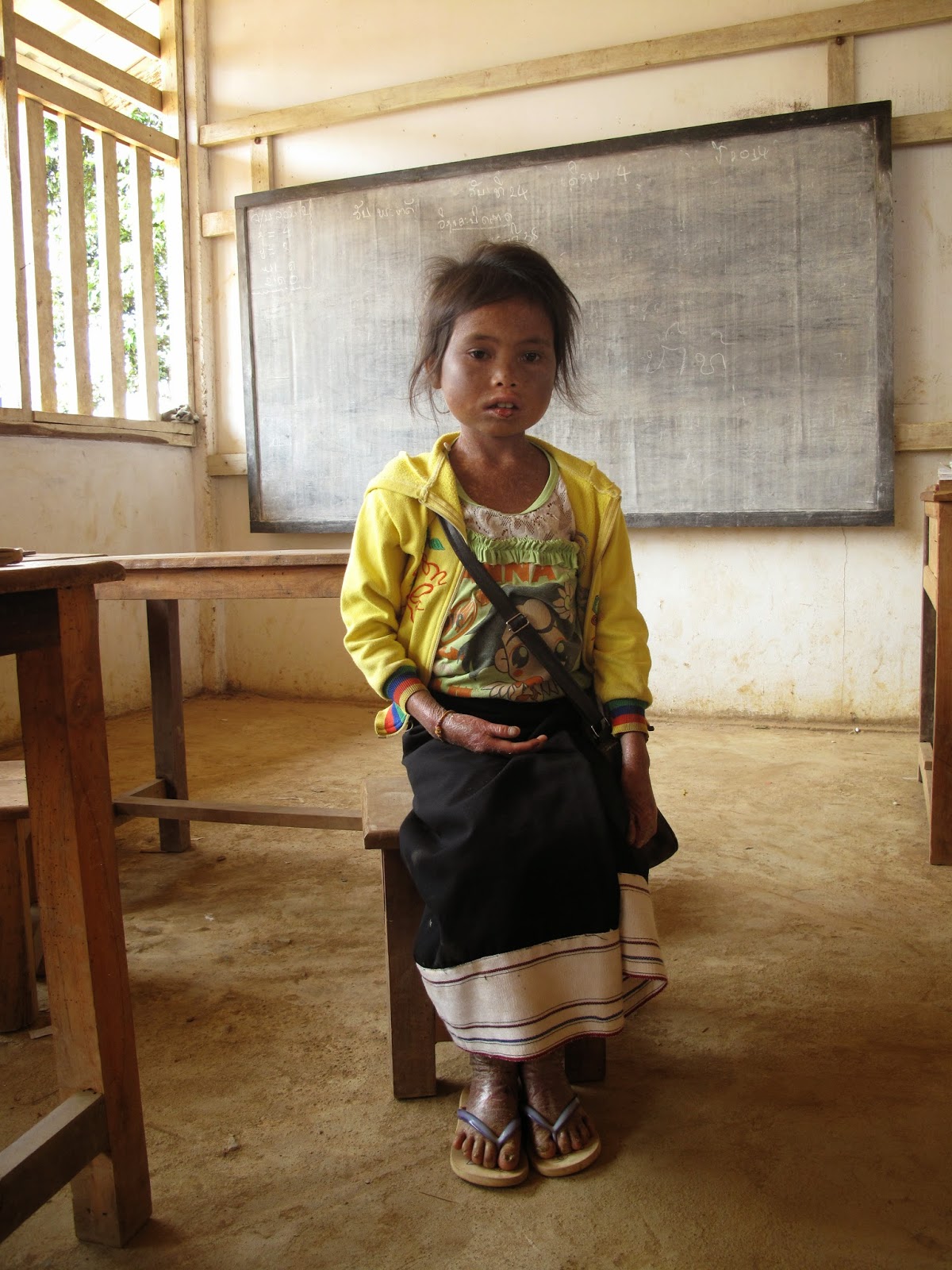During Global Action Week on Education, UNICEF’s Carlos Vasquez talks about his experience in Udomxay province, Lao PDR:
9 year old Cheet, from the Kmu ethnic group, was born with a severe skin disease which is affecting her everyday life and ability to have a childhood like her friends. The only medical treatment she received was when she was born but there was little the doctor could do to help and due to a lack of money her family is unable to get any further medical support for her.
With each passing day Cheet finds it more difficult to move her fingers and toes, and I could see the scars left by her medical condition on her delicate face.
“It’s difficult for Cheet to walk to school,” her father tells me. He explains to me that for one hour each day Cheet walks slowly towards her school in this hilly remote village.
This is a huge challenge the best of times, and close to a nightmare during the hot season when temperatures get close to 40 degrees Celsius. But it was obvious to me that Cheet was a girl determined to get an education.
This was especially clear when her frail face and weak eyes suddenly lit up as she moved towards the blackboard to lead her classmates in a class exercise. She clearly savoured these moments.
When break time was signaled by the school teacher the quiet, dusty yard in front of the school suddenly came alive with 125 students talking and playing. Many quickly drank water and went to play petanque, a traditional game from France played throughout Lao PDR.
As the boys took turns with the girls to throw the balls into the dusty ground, Cheet moved through the shaded veranda with her friends. Her soft walk and slow, deliberate movements reflected her determination to walk the seven metres or so from the classroom door to the end of the corridor to watch children play in the school yard.
As part of UNICEF Lao PDR’s water and sanitation team, I came to this remote rural village of Mokhokan to check on the recently built toilet facilities and water connection system, supported by the Australian Government.
These facilities included ramps which would make it easier for disabled children, like Cheet, to access toilets. This is especially important in a country like Lao PDR, where an estimated 57% of the schools do not have functioning WASH facilities and rural communities still practice open defecation. These facilities offers children like Cheet easier to access to adequate sanitation services in schools.
UNICEF is now helping to bring water to communities and sanitation facilities to school children living in these remote rural areas that have inadequate or insufficient access to water and sanitation facilities.
Access to clean water and sanitation goes hand in hand with helping children achieve more at school and during this Global Action Week on Education, focusing on disability, UNICEF is as determined as ever to help make the lives of children like Cheet as fulfilling as possible.
 |
| Cheet, 9 (c) UNICEF/LAOS/2014/C.Vasquez |
With each passing day Cheet finds it more difficult to move her fingers and toes, and I could see the scars left by her medical condition on her delicate face.
“It’s difficult for Cheet to walk to school,” her father tells me. He explains to me that for one hour each day Cheet walks slowly towards her school in this hilly remote village.
This is a huge challenge the best of times, and close to a nightmare during the hot season when temperatures get close to 40 degrees Celsius. But it was obvious to me that Cheet was a girl determined to get an education.
This was especially clear when her frail face and weak eyes suddenly lit up as she moved towards the blackboard to lead her classmates in a class exercise. She clearly savoured these moments.
When break time was signaled by the school teacher the quiet, dusty yard in front of the school suddenly came alive with 125 students talking and playing. Many quickly drank water and went to play petanque, a traditional game from France played throughout Lao PDR.
As the boys took turns with the girls to throw the balls into the dusty ground, Cheet moved through the shaded veranda with her friends. Her soft walk and slow, deliberate movements reflected her determination to walk the seven metres or so from the classroom door to the end of the corridor to watch children play in the school yard.
As part of UNICEF Lao PDR’s water and sanitation team, I came to this remote rural village of Mokhokan to check on the recently built toilet facilities and water connection system, supported by the Australian Government.
 |
| Handwashing in UNICEF supported facilities (c) UNICEF/LAOS/2014/C.Vasquez |
These facilities included ramps which would make it easier for disabled children, like Cheet, to access toilets. This is especially important in a country like Lao PDR, where an estimated 57% of the schools do not have functioning WASH facilities and rural communities still practice open defecation. These facilities offers children like Cheet easier to access to adequate sanitation services in schools.
UNICEF is now helping to bring water to communities and sanitation facilities to school children living in these remote rural areas that have inadequate or insufficient access to water and sanitation facilities.
Access to clean water and sanitation goes hand in hand with helping children achieve more at school and during this Global Action Week on Education, focusing on disability, UNICEF is as determined as ever to help make the lives of children like Cheet as fulfilling as possible.

No comments:
Post a Comment